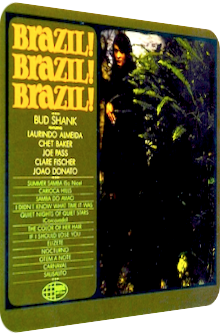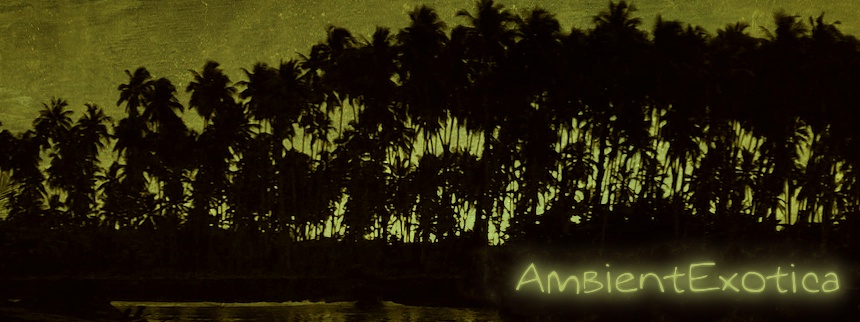
Bud Shank
Brazil! Brazil! Brazil!
1966
Imagine a shady TV preacher screaming the album title of saxophonist and composer Clifford Everett “Bud” Shank, Jr.'s (1926–2009) album Brazil! Brazil! Brazil!, and you are either in the mood, or run away in panic. If the latter is the case, Shank’s sextet hopefully carries you home. Released in 1966 on the World Pacific label, it features the talent of pianist, organist and frequent collaborator Douglas Clare Fischer, pianist and composer João Donato, guitarists Joe Pass and Laurindo Almeida as well as trumpeter Chet Baker.
Here comes the twist: the band is accompanied by a small string ensemble which adds lilac ruralities and technicolor rhizomes to the 12 – already sunny – concoctions. As Clare Fischer, Laurindo Almeida and João Donato are prolific composers, one can count on their vivid imagination and will to inject their own material into the album, and this also applies to Brazil! Brazil! Brazil! which sports seven instrumentals in total by these gentlemen. The remaining five tracks are not necessarily Brazilian, but showcase the talent of North American writers too. The unique material is worth the record’s existence alone, as is the careful blending of non-Latin elements with the well-known and loved stereotypes. Many of the compositions are uplifting, upbeat and uptempo, so there is always a joyful and refreshing aura in the air, for there are no classics such as Brazil, Taboo or The Breeze And I on this album. Shank and his fellow musicians choose wisely and try to impress with new melodies or witty mutations rather than tailoring an album for the fans of renditions.
Brazil! Brazil! Brazil! is not all about the sextet, just as Ferrante & Teicher‘s Pianos In Paradise (1962) is not solely about the pianists’ interplay, and so the opener Summer Samba, originally envisioned by Marcos and Paulo Sérgio Valle as well as Norman Gimbel, launches in medias res, with the orchestral string washes already intact, boldly alloying Clare Fischer’s organ sprinkles, Chet Baker’s trumpet protrusions and Bud Shank’s lead saxophone. Joe Pass’ acoustic guitar accents serve as the rhythm aorta and further decrease the Latin feeling of this piece which is strikingly transfigured. This interpretation –as well as the whole album – is about a glorified state, a genre mélange known under the name Exotica. The orchestra continues to shine on Clare Fischer’s own Elizete, a quasi-nocturnal Bossa Nova with softly shuffling maracas, moon-lit saxophone glints and insouciant acoustic guitar, their moist attack rate serving as the only clear-cut Latin remnant. The problem with such moon-evoking songs is the saturation of the market, and Elizete cannot overcome the mystical aura of the well-known Moon Of Manakoora, but fans of soothing Exotica and rather quiescent interstices are served good enough by Fischer here.
The atmosphere of the prior Elizete is a harbinger of Laurindo Almeida’s following Nocturno, an organ-interspersed composition with Bud Shank’s tenor saxophone in the limelight and situated right next to the lofty-mountainous appearance of Almeida’s oily guitar play. The same can be said here as well: a nightly tune by the numbers, but benign enough to be embraceable. What follows is a duo of unique Clare Fischer songs: while Otem A Note is an uplifting Bossa Nova brought to life with large-grained maracas, Shank’s sax sequences, half-yearning strings and a dun-colored piano accompaniment, Carnaval is texturally fascinating, as it is awash with sunlight, sees Fischer’s performance on the piano as the central force and ameliorates the carefreeness with mauve-tinted string washes. A very catchy tune and definitely not convoluted at all.
Side A closes with João Donato’s uplifting proto-Lounge anthem Sausalito which gains its energy from multitudinous string layers, lofty sax tones and a chaparral of coruscating hi-hats and shakers. An accidental harbinger of John Klemmer’s Brazilia (1979) and an enchanted rain forest of the mind, Sausalito blends this kind of silkiness which grew essential much later. Ahead of its time, its genius was not recognized back in 1966… and is too picayune for the frilly Funk-charged 70's.
Side B opens with If I Should Lose You, a Brazilianized interpretation of Leo Robin’s and Ralph Rainger’s classic. The overtones oscillate between soft threnody and utter devotion, but it is the textures in front of the walls of strings that transform it to sun-dried lands, especially Almeida’s guitar which luckily leaves room for the occasional glint of Clare Fischer’s bachelor pad organ. Almeida’s Carioca Hills offers another dose of convivial adventures and seems to evoke a cruise around the Copa Cabana. Fast-paced, sporting dry acoustic guitars and glitzy percussion, the strings make the important difference and cover the lacunar structure.
Whereas Antonio Carlos Jobim‘s and Gene Lee‘s Samba Do Aviao intertwines euphonious strings with Shanks’ silkened lead sax and Baker’s trumpet, Richard Rodgers’ and Lorenz Hart’s (I Didn’t Know) What Time It Was has survived the transmutation to the genre of Brazilian music best, as the enchanting piece is first accompanied by bongo blebs and then presents plucked, sepia-toned guitar strings. Jobim’s second tune Quiet Nights (Corcovado) then features Clare Fischer on a particularly blurred piano whose diffuse light scatters through the string thicket and also illumines the sensible cymbal cascades. And yes, this one is indeed another night-focused corker. The finale The Color Of Her Hair by Laurindo Almeida is a short sunset valley song of less than two minutes which seems to be about a drive through serpentine mountain ranges as delivered by bubbling double bass billows and an innocence which, for once, truly meshes the busy strings with the leading guitars. An uplifting closure.
The sound of a quintet augmented by an orchestra, yep, this has been done before and ever since, but when Latin-focused works are ennobled by the expected string washes, the enchantment level usually grows, for these strings make sure that the archetypical Latin murkiness and utter devotion do not seem overly mighty. Unsurprisingly, the opposite is indeed the case, as the exclamation mark galore Brazil! Brazil! Brazil! focuses on the brighter, sunnier styles such as Samba and Bossa Nova, and once this is not the case, the compositions are poignantly enough imported from North American icons such as Leo Robin and Ralph Rainger on the one hand, or coated in tropical moonbeams on the other hand. The album is aesthetically pleasing due to its large roster of unique material specifically written with this artifact in mind.
Exotica fans tend to love their favorite genre for the opposite reason, namely the appearance of beloved material in various arrangements and tempos. Brazil! Brazil! Brazil! is ultimately about both the newness of the previously unheard material and the string backdrop, as is the majority of Bud Shank’s albums. Here, songs like Clare Fischer’s silkily veiled Elizete, his lens flare-illumined Carnaval as well as João Donato’s Batucada-oid breakneck forest Sausalito rely as much on the string side as they are keen on sunlit guitars and translucent organ sparks, the latter of which are always transformative parts in Latin music; Walter Wanderley comes to mind. Brazil! Brazil! Brazil! is currently only available on vinyl. I do not even dare to dream about a remastered digital incarnation, but as the old wisdom goes, “the best is yet to come.”
Exotica Review 296: Bud Shank – Brazil! Brazil! Brazil! (1966). Originally published on Dec. 21, 2013 at AmbientExotica.com.
